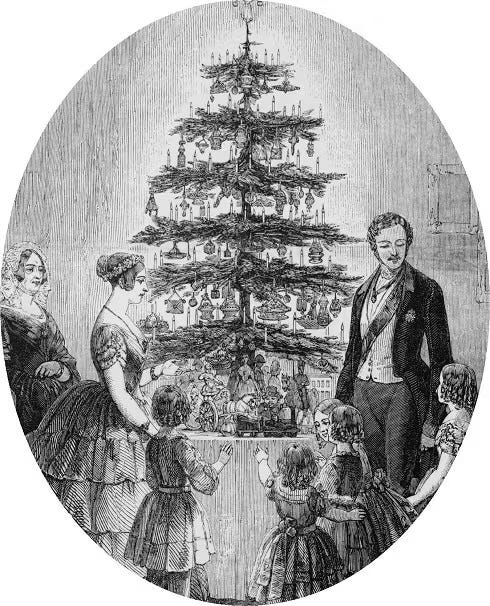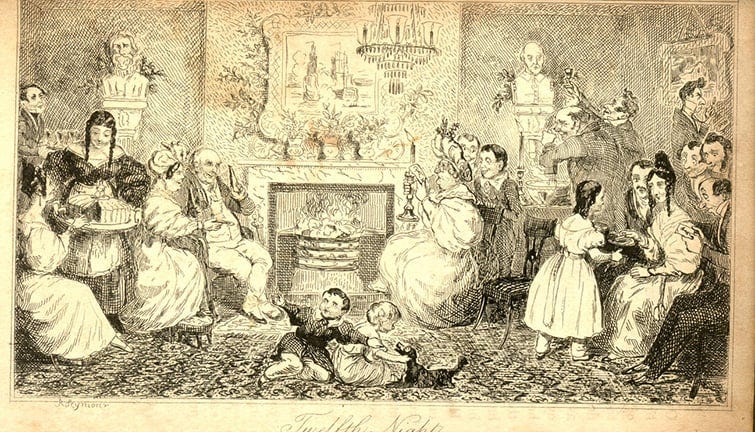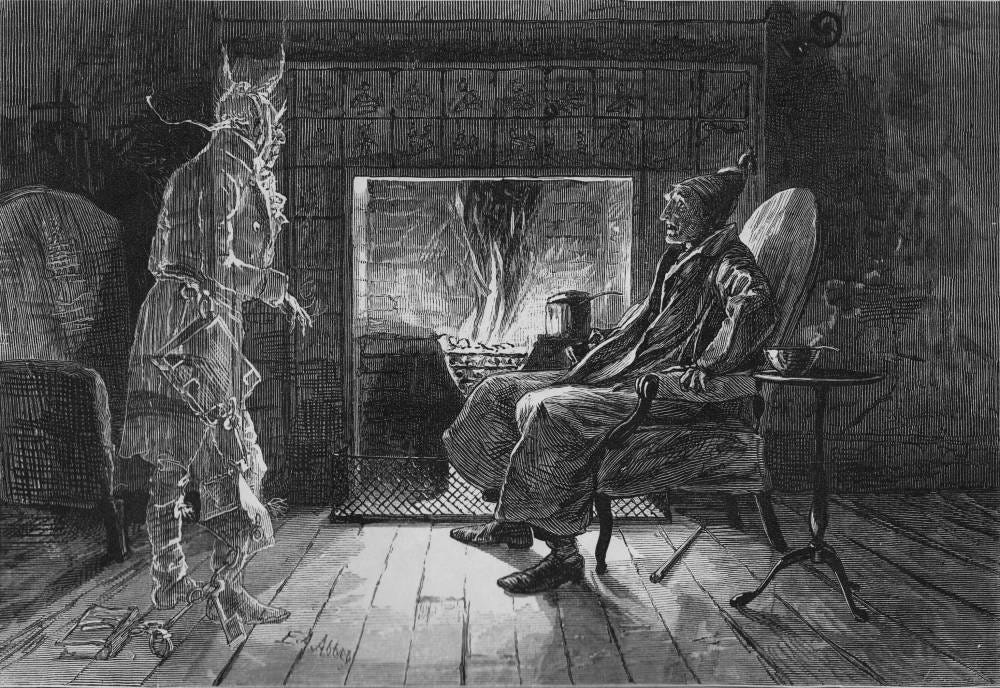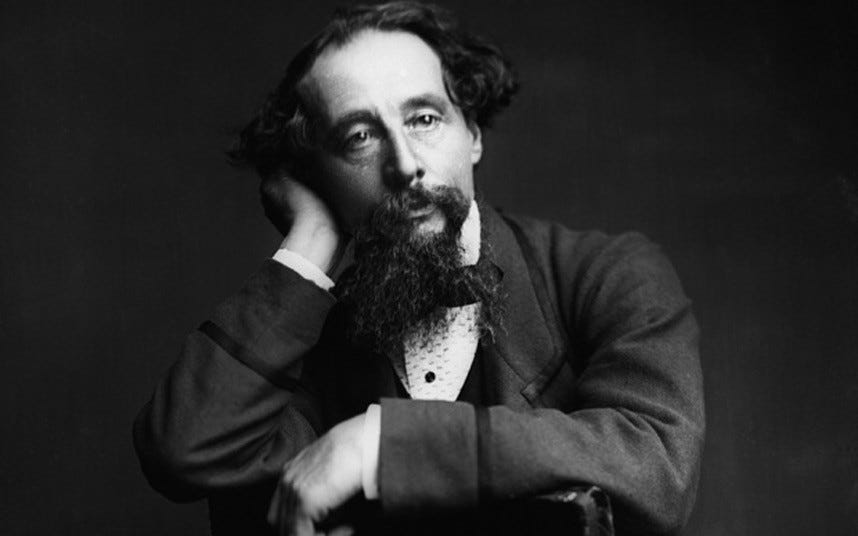Christmas in Dickens’ Time
Charles Dickens, who would eventually reinvent Christmas with his sparkling book ‘A Christmas Carol,’ celebrated humble Christmases as a child.
Almost instantly after publication, Charles Dickens’ novel A Christmas Carol sparked new vigor in Victorian society for the festivities. However, Advent—and the traditions associated with it—were practiced by Christians long before he was born.
As a child, Dickens celebrated Christmas with some traditions that we wouldn’t recognize today. Granted, these traditions varied by region; in some English towns, December 25 was not even the ‘official’ holiday in their calendar.
It’s a shame that so many of those traditions disappeared. They added flavors to the holiday that most of us in the twenty-first century will never have a chance to taste.
We do still have customs that we share with those revelers. Perhaps the most important is that Christmas was, and remains, a time for family gatherings. Regardless of what century it might be, families always tried to celebrate Christmas together.
Was gift-giving also a common practice among the Victorians? Well, that depends on the social class that the family fit into.
This was a time when poverty was prevalent among ordinary citizens. Most families wouldn’t have been able to afford extravagant gifts. In some cases, those with little money to spare got creative, exchanging sentimental things such as poetry and music.
Perhaps this is, in part, why Christmas carols have always been a favorite holiday pastime—rich or poor, all could sing.
There’s irony in the fact that Charles Dickens, who would eventually reinvent Christmas with his sparkling book A Christmas Carol, celebrated humble Christmases as a child.
The Dickens family never had the comforts of economic stability. Charles’ father, John, consistently failed to hold a job. On many instances, the family was forced to relocate, each time to less savory areas—neighborhoods plagued with crime and filth.
In 1822, Charles’ mother Elizabeth made an attempt to assist with their monetary situation. She thought she might have success establishing a school in London. Full of enthusiasm, Mrs. Dickens rented a house on Gower Street North.
She nailed a plaque on the door pronouncing it to be Mrs. Dickens’ School. However, nobody enrolled, causing her dream to fall flat on its face.
Charles Dickens would later comment on this failed attempt:
I left, at a great many other doors, a great many circulars calling attention to the merits of the establishment. Yet nobody ever came to school, nor do I recollect that anybody ever proposed to come, or that the least preparation was made to receive anybody.
All these years later, not knowing the full story, I will admit it: I feel sympathy for Elizabeth Dickens.
At a time when women were not encouraged to be breadwinners, her goal seemed reasonable enough. There were plenty of children in London who would have benefited from an education, and her family needed money. She must not have advertised correctly, or perhaps there is a detail that Charles left out.
If she’s with us today—if she is lurking somewhere in the back of the Tearoom, hiding her face—I would like to address Mrs. Dickens. I’d say that I admire her for attempting to support her family when her husband could not do the same.
Humble as young Charles Dickens’ Christmases were, he did have positive memories of those celebrations. He would later carry his favorite traditions into his own home, when he started his family.
If the Christmas stories he wrote aren’t proof enough, his children’s words attest that Charles Dickens had a great love for Christmas. He enjoyed many of the long-defunct Christmas traditions. According to Dickens’ children, he had a special love for games such as Blindman’s Buff and the Twelfth Night party.
Charles Dickens’ love for Twelfth Night parties must have begun when he was a youth. Before he threw himself into the occupation of writing, Charles dreamed of becoming an actor on the theater stage.
During typical Twelfth Night parties, roles were assigned to each guest to play out throughout the night. I can imagine that he greatly enjoyed playing his role each year.
Twelfth Night parties were almost always accompanied by an elaborate cake, into which was baked a bean. The cake was sliced into even pieces, and whoever found the bean in their slice was dubbed Lord of Misrule. The recipient of the Twelfth Night bean was expected to bake the following year’s cake.
Whatever the Lord of Misrule decided, the rest of the ‘characters’ must do. Sometimes the entire ‘cast’ of a Twelfth Night party was decided before it began. This was done in a number of different ways. Most commonly, roles were written on slips of paper that were placed in a hat. The hat was passed around, and each guest would take a paper. Whichever role they drew was theirs for the duration of the game.
I can see why Charles Dickens, aspiring actor and, later, storyteller, would have enjoyed such a party. I wonder, was he ever Lord of Misrule? How entertaining his Christmas parties must have been!
It’s a good thing that the child Dickens’ Christmas celebrations produced happy memories, for he had few happy memories growing up. Forced into work at the young age of twelve, he did not even have the privilege of attending school.
Mr. and Mrs. Dickens had faith that their eldest child, Fanny, might be able to help monetarily with her musical talent. As a result, Fanny received the privilege of being sent to music school. While Charles spent his youth at work, Fanny studied at the esteemed Royal Academy of Music. The expense that the Dickens family paid for her studies, thirty-eight guineas a year, was far from their reach.
Did Charles feel resent because of his sister’s fortune? Author Claire Tomalin in her biography Dickens: A Life comments:
Dickens maintained that he never felt any jealousy of what was done for her … [but] he could not help but be aware of the contrast between his position and hers, and of their parents’ readiness to pay handsome fees for her education, and nothing for his.
Though the choice to send twelve-year-old Charles to a factory was made by both of his parents, he would later have a familial, albeit distant, relationship with John. In contrast, he would resent Elizabeth for the rest of his life.
John Dickens’ mother died in 1825 while he was in debtor’s prison, leaving an inheritance that helped him to bail out. Though this was fortunate for John, it would not release Charles from his purgatory. John and Elizabeth thought he ought to continue at the factory.
There appears to have been an instance when John contemplated sending Charles back to school. However, Elizabeth argued that the boy should continue at the factory. Could this have been the cause of his lifelong anger towards her?
Later, Charles would say:
My father said I should go back no more [to the factory], and should go to school. I do not write resentfully or angrily … but I never afterwards forgot, I never shall forget, I never can forget, that my mother was warm for my being sent back.
Charles was at last enrolled at a different school when he was fifteen, but the damage had been done. He determined to put as much distance between himself and his parents as possible.
It was at Wellington, this new school, that Charles found his own sense of self. He also began to experiment with the art of writing.
Charles began submitting short stories to periodicals. When the editors published them, the young man was over the moon! Though Charles did not make money off of these publications, he felt that he at last had a purpose.
He wandered about London with the pages in his hands, ecstatic. He’d at last achieved something of his own, something he wanted, something his.
From a young age, Charles read anything that he could get his hands on. After he began to write, the act of putting pen to paper became a means by which to cope with the trauma that took root in his heart during childhood.
Whatever took place at that factory, he never fully overcame it. I am not alone in theorizing that he wrote because he was attempting to outrun these hurts. He wanted to leave in his past the people who had done him harm.
I wonder if he wrote A Christmas Carol and other holiday books to make amends for the humble Christmases he celebrated as a child.
When Ebenezer Scrooge grapples with the Ghost of Christmas Past, is it really Dickens trying to make peace with the childhood he never had? When Scrooge encounters the Ghost of Christmas Future, is it Dickens telling readers not to forget the poor during this holy season, because he himself had known poverty?
Written in 1843, the book A Christmas Carol was completed in six weeks. Though he had established himself as an author by then with works like The Pickwick Papers, Dickens was struggling financially that year. He hoped that his new Christmas book would help him sort out these matters.
Published on December 1, 1843, the first edition of A Christmas Carol sold out by Christmas Eve. Dickens’ audience was fascinated by Scrooge’s tale of redemption. In the years since, it’s been reprinted countless times. It remains the most popular Christmas story.
Although A Christmas Carol sold out, that first edition didn’t solve his financial problems. Having always been fastidious when it came to his work, Dickens had a specific idea of how he wished for his story to be presented, down to the color of the book cover. The materials required to make this vision reality took a great deal out of his earnings.
I imagine he was still pleased by the enthusiastic reception of his new story. An instant classic, it continued to sell in the years that followed, providing a continuous profit to make up for the financial setbacks of that first edition.
Charles Dickens had become world-famous by the time he died, but he remained a broken and flawed man. It goes to show that what happens during a child’s early years can affect them for life, regardless of their successes.
I believe that he used his characters, including Ebenezer Scrooge, to search for something inside of him that had been stolen. Perhaps he never found it; I mourn for the young boy who was humiliated, working at a factory when he wanted to go to school.
In spite of Dickens’ many faults, he remains my favorite author.
I hope the Advent season is treating you well! Do you have favorite Christmas traditions of your own? Please feel free to comment and tell me!
Charles Dickens: The Man who Reinvented Christmas
“You may be an undigested bit of beef, a blot of mustard, a crumb of cheese, a fragment of underdone potato. There’s more of gravy than of grave about you, whatever you are!”








I am so enjoying learning more about the life of Charles Dickens, thank you for sharing! 😊 I am really enjoying reading A Christmas Carol. 🤍
I've always loved Dickens' novels but never knew about his youth. How beautiful that he transformed his suffering into a kind of glory through his works.